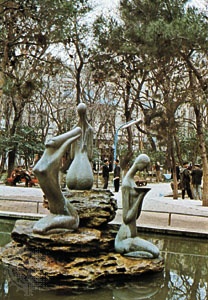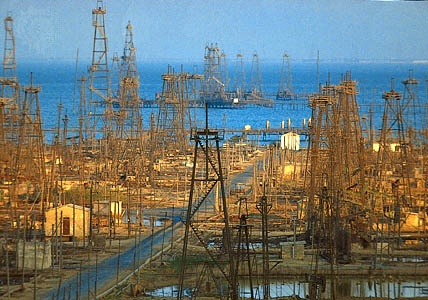Baku
Azerbaijan
Azerbaijani Bakı
 city, capital of Azerbaijan. It lies on the western shore of the Caspian Sea and the southern side of the Abşeron Peninsula, around the wide, curving sweep of the Bay of Baku. The bay, sheltered by the islands of the Baku Archipelago, provides the best harbour of the Caspian, while the Abşeron Peninsula gives protection from violent northerly winds. The name Baku is possibly a contraction of the Persian bad kube (“blown upon by mountain winds”). Baku derives its importance from its oil industry and its administrative functions.
city, capital of Azerbaijan. It lies on the western shore of the Caspian Sea and the southern side of the Abşeron Peninsula, around the wide, curving sweep of the Bay of Baku. The bay, sheltered by the islands of the Baku Archipelago, provides the best harbour of the Caspian, while the Abşeron Peninsula gives protection from violent northerly winds. The name Baku is possibly a contraction of the Persian bad kube (“blown upon by mountain winds”). Baku derives its importance from its oil industry and its administrative functions.The first historical reference to Baku dates from AD 885, although archaeological evidence indicates a settlement there several centuries before Christ. By the 11th century AD, Baku was in the possession of the Shīrvān-Shāhs, who made it their capital in the 12th century, although for a period in the 13th and 14th centuries it came under the sway of the Mongols. In 1723 Peter I (the Great) captured Baku, but it was returned to Persia in 1735; Russia captured it finally in 1806. In 1920 Baku became capital of the Azerbaijan republic.
The core of present-day Baku is the old town, or fortress, of Icheri-Shekher. Most of the walls, strengthened after the Russian conquest in 1806, survive, as does the 90-foot (27-metre) tower of Kyz-Kalasy (Maiden's Tower, 12th century). The old town is highly picturesque, with its maze of narrow alleys and ancient buildings. These include the Palace of the Shīrvān-Shāhs (now a museum), the oldest part of which dates from the 11th century. Also of the 11th century is the Synyk-Kala Minaret and Mosque (1078–79). Other notable historic buildings are the law court (Divan-Khan), the Dzhuma-Mechet Minaret, and the mausoleum of the astronomer Seida Bakuvi. The walled city, along with the Palace of the Shīrvān-Shāhs and Maiden's Tower, were collectively designated a UNESCO World Heritage site in 2000.
Around the walls of the fortress, the regular streets and imposing buildings of modern Baku rise up the slopes of the amphitheatre of hills surrounding the bay. Along the waterfront an attractive park has been laid out. Most industrial plants are located at the eastern and southwestern ends of the city. Greater Baku, divided into 11 districts, encompasses almost the entire Abşeron Peninsula as well as islands off the tip of the peninsula and another built on stilts in the Caspian Sea, 60 miles (100 km) from Baku.
 The basis of Baku's economy is petroleum. The presence of oil has been known since antiquity, and by the 15th century oil for lamps was obtained from surface wells. Modern commercial exploitation began in 1872. The Baku oil field at the beginning of the 20th century was the largest in the world, and it remained the largest field in what was then the Soviet Union until the 1940s. By the late 20th century, much of the easily extractable reserves had been exhausted; drilling was subsequently extended far underground and outward across the Abşeron Peninsula and into the seabed. After Azerbaijan became independent, foreign companies contracted to explore for other potentially lucrative sites and develop them, and new refineries were established. Many derricks stand in the gulf facing the city. Most of the subordinate townships are drilling centres, linked by a network of pipelines to the local refineries and processing plants. From Baku oil is piped to Batumi on the Black Sea or sent by tanker across the Caspian and up the Volga River. Besides oil processing, Baku is a large centre for the production of equipment for the oil industry. Metalworking, shipbuilding and repair, the manufacture of electrical machinery, the production of chemicals and construction materials, and food processing also contribute to the local economy.
The basis of Baku's economy is petroleum. The presence of oil has been known since antiquity, and by the 15th century oil for lamps was obtained from surface wells. Modern commercial exploitation began in 1872. The Baku oil field at the beginning of the 20th century was the largest in the world, and it remained the largest field in what was then the Soviet Union until the 1940s. By the late 20th century, much of the easily extractable reserves had been exhausted; drilling was subsequently extended far underground and outward across the Abşeron Peninsula and into the seabed. After Azerbaijan became independent, foreign companies contracted to explore for other potentially lucrative sites and develop them, and new refineries were established. Many derricks stand in the gulf facing the city. Most of the subordinate townships are drilling centres, linked by a network of pipelines to the local refineries and processing plants. From Baku oil is piped to Batumi on the Black Sea or sent by tanker across the Caspian and up the Volga River. Besides oil processing, Baku is a large centre for the production of equipment for the oil industry. Metalworking, shipbuilding and repair, the manufacture of electrical machinery, the production of chemicals and construction materials, and food processing also contribute to the local economy.Baku is also a major cultural and educational centre. It is the site of Baku State University (founded 1919), Khazar University (1991), and Azerbaijan Technical University (1950); there are also several other institutions of higher education, including one specializing in the oil industry. The Azerbaijan Academy of Sciences comprises numerous scientific-research establishments. Museums include the State Art Museum (founded 1924) as well as collections devoted to education, history, and literature. There are also a number of theatres. An international airport is located southeast of the city. Azerbaijanis are the dominant ethnic group, but there are also large numbers of Russians. Baku is the birthplace of Lev Davidovich Landau (Landau, Lev Davidovich), winner of the 1962 Nobel Prize for Physics. Pop. (2003 est.) 1,828,800.
- Hudson, Henry
- Hudsonian orogeny
- Hudson, Jennifer
- Hudson Maxim
- Hudson River
- Hudson River school
- Hudson, Rock
- Hudson's Bay Company
- Hudson Strait
- Hudson, Thomas
- Hudson, W H
- Hue
- hue and cry
- Huehuetenango
- Huelva
- Huerta, Adolfo de la
- Huerta, Dolores
- Huerta, Victoriano
- Huesca
- Huesca, Code of
- Huet, Pierre-Daniel
- Huey Long
- Huey P. Newton
- Huey Smith
- Hu Feng